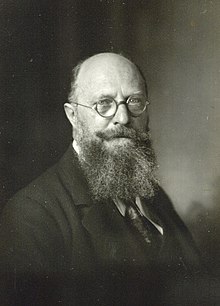Thorvald Stauning
Thorvald August Marinus Stauning (born October 26, 1873 in Copenhagen ; † May 3, 1942 ibid) was a Danish social democratic politician and statesman. He was Danish Prime Minister ( State Minister ) from 1924 to 1926 and again from 1929 until his death in 1942 . He was the first Social Democrat to hold this post.
Life
Born on October 26th, 1873 in Copenhagen, Thorvald Stauning grew up in poor circumstances. In addition to his training in a cigar factory, he attended evening school, where he trained in German and bookkeeping. In 1890 Stauning joined the Social Democratic Party of Denmark ( Socialdemokratiet ) and a short time later became active in the union. From 1896 to 1906 he was chairman of the trade union federation of tobacco workers. In 1899 he got a job as the party's cashier. In 1910 Stauning became party chairman, which he held until 1939. From 1913 to 1925 Stauning was also a member of the Copenhagen City Council, and from 1919 to 1924 even as its chairman. Stauning became a member of the government in 1916 when he was appointed minister of control. This post was created to avert an emerging political crisis; each of the three opposition parties sent a minister of control to the government.
Stauning worked from 1918 to 1920 as minister of social affairs and labor within the government. In 1924, the Social Democrats established the government for the first time and Stauning became head of government ( State Minister ) of this social democratic minority government . However, due to an election defeat, the government had to resign in 1926. In 1929 the Social Democrats won again in the elections and remained in government together with the social liberal party Det Radikalische Venstre until 1940 with Stauning as head of government. During this time the coalition government managed to lead Denmark out of the Great Depression and to rehabilitate the Danish economy. Under Stauning's leadership, Denmark became a social welfare state . The resulting social stability was one of the reasons why fascist and communist currents were not as popular there as in other European countries. As a pacifist , Stauning tried to maintain strict neutrality with the German Reich . As German troops Denmark occupied , he called on his countrymen to remain calm. His excellent negotiating skills were one of the reasons why Denmark retained a relatively large amount of self-determination despite the German occupation. Stauning acted as head of government in the all-party government that ruled under the German occupation from 1940 .

Stauning died on May 3, 1942 in Copenhagen. He was buried in Copenhagen's West Cemetery.
Political career
Stauning's political beginnings lie in the labor movement , for example he organized the Second International in Copenhagen in 1910 . In the 1930s, Stauning developed more and more into the father of the country. He was considered a very charismatic politician. He put the party program of 1934 under the motto "Danmark for folket" (Denmark for the people), which reflected his efforts to transcend any form of class politics. As party chairman he succeeded in uniting the most diverse groups of voters in the social democratic party and thus transforming the party from a class to a people's party. Across all parties, Stauning was seen as a guarantor of political stability and parliamentary democracy, even during the crisis-ridden interwar period for Denmark. Towards the end of his life, however, Stauning was faced with uncertain future prospects for social democratic politics.
Honors
The Stauningalpen , a mountain range over 2800 m high in the Northeast Greenland National Park , is named after Thorvald Stauning .
Web links
- Literature by and about Thorvald Stauning in the catalog of the German National Library
- Newspaper article about Thorvald Stauning in the 20th century press kit of the ZBW - Leibniz Information Center for Economics .
| personal data | |
|---|---|
| SURNAME | Stauning, Thorvald |
| ALTERNATIVE NAMES | Stauning, Thorvald August Marinus (full name) |
| BRIEF DESCRIPTION | Danish social democratic politician and statesman |
| DATE OF BIRTH | October 26, 1873 |
| PLACE OF BIRTH | Copenhagen |
| DATE OF DEATH | May 3, 1942 |
| Place of death | Copenhagen |

